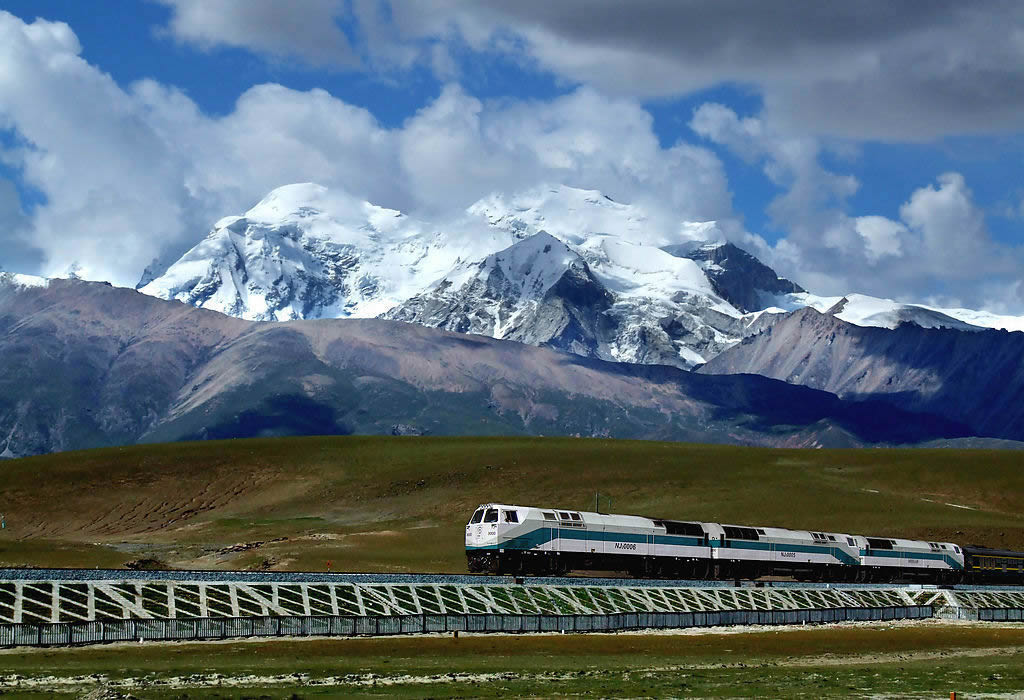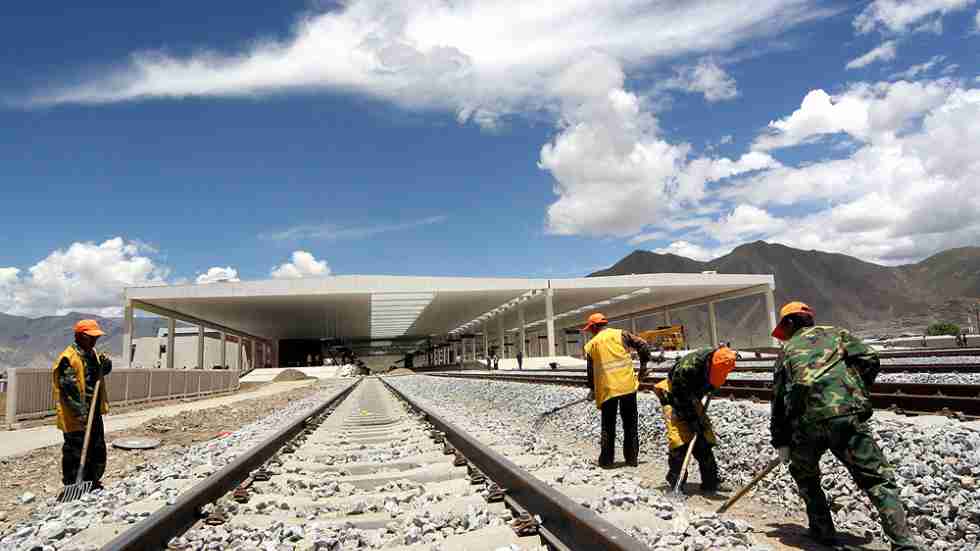


Chinese Foreign Minister Wang Yi holds talks with visiting Nepalese Deputy Prime Minister and Foreign Minister Krishna Bahadur Mahara in Beijing, capital of China, Sept. 7, 2017. (Xinhua/Zhang Ling)
The construction of a Sino-Nepali railway will help China strengthen its influence in South Asia, as well as lessening Nepal’s economic and diplomatic dependence on India, experts said.
During a six-day visit to China in September, Nepal’s Deputy Prime Minister and Foreign Minister Krishna Bahadur Mahara successfully inked a deal with China to step up plans for a trans-Himalayan rail link, a proposal that Nepal has been keen to accomplish since 2005.
After talks with Mahara, Chinese Foreign Minister Wang Yi said the construction of a cross-border Sino-Nepali railway is a strategic cooperation plan raised jointly by leaders from both nations. The two countries have agreed to fast track a feasibility study for the railway’s construction, as well as carrying out cooperation in training talents and railway investigation and design.

[File photo]
According to a plan raised by Nepal’s former Prime Minister KP Sharma Oli in March 2016, the railway will include two rail lines, with one connecting three of Nepal’s most important cities and two crossing the border from China into Nepal.
In addition, two highways that served as the two nations’ traditional land route will be rebuilt, as much of their infrastructure was destroyed in a major earthquake in 2015.
“Currently, the freight transportation between China and Nepal mainly relies on highways, which are in bad condition and can be affected by natural disasters. The highway system has already reached its full capacity, therefore a cross-border railway is needed to connect Nepal with the outside world,” Lin Minwang, a professor at the Institute of International Studies of Fudan University, told Xiaokedao, the WeChat account of People’s Daily Overseas Edition.
According to Xiakedao, China was already planning to extend its internal railway from the Tibetan city of Shigatse to Gyirong on the Nepal border, but it’s still unclear if the extension can reach to Kathmandu, capital of Nepal, as the impoverished landlocked country has been under pressure from India.

[File photo]
Due to its unfavorable geopolitical conditions, Nepal has to rely on India to transport most of its commodities, including oil and gas. Around 60 percent of the country’s economy relies on India, giving India a certain level of control over Nepal. In 2015, when Nepal issued its new constitution, India imposed a 5-month blockade on it in order to secure the rights of the Madhesi, leaving Nepal with crippling shortages in fuel and cooking gas.
According to experts, China’s help and the recent Sino-Indian standoff have shown Nepal a promising way to shake off India’s control, encourage it to seize the chance to build the railway, and establish closer ties with China.
As for China, the cross-border railway will promote economic cooperation between Central Asia and Tibet. Meanwhile, fruits and other daily necessities can be transported from South Asia into Tibet, lowering the locals’ living cost.
“The construction of the cross-border railway will promote the establishment of a Sino-Nepali economic corridor, supporting the latter’s political stability and improving the people’s livelihood. China can also use the chance to strengthen its presence in South Asia, urging India to build a prosperous South Asia together, ” said Lin.
 Fire brigade in Shanghai holds group wedding
Fire brigade in Shanghai holds group wedding Tourists enjoy ice sculptures in Datan Town, north China
Tourists enjoy ice sculptures in Datan Town, north China Sunset scenery of Dayan Pagoda in Xi'an
Sunset scenery of Dayan Pagoda in Xi'an Tourists have fun at scenic spot in Nanlong Town, NW China
Tourists have fun at scenic spot in Nanlong Town, NW China Harbin attracts tourists by making best use of ice in winter
Harbin attracts tourists by making best use of ice in winter In pics: FIS Alpine Ski Women's World Cup Slalom
In pics: FIS Alpine Ski Women's World Cup Slalom Black-necked cranes rest at reservoir in Lhunzhub County, Lhasa
Black-necked cranes rest at reservoir in Lhunzhub County, Lhasa China's FAST telescope will be available to foreign scientists in April
China's FAST telescope will be available to foreign scientists in April "She power" plays indispensable role in poverty alleviation
"She power" plays indispensable role in poverty alleviation Top 10 world news events of People's Daily in 2020
Top 10 world news events of People's Daily in 2020 Top 10 China news events of People's Daily in 2020
Top 10 China news events of People's Daily in 2020 Top 10 media buzzwords of 2020
Top 10 media buzzwords of 2020 Year-ender:10 major tourism stories of 2020
Year-ender:10 major tourism stories of 2020 No interference in Venezuelan issues
No interference in Venezuelan issues
 Biz prepares for trade spat
Biz prepares for trade spat
 Broadcasting Continent
Broadcasting Continent Australia wins Chinese CEOs as US loses
Australia wins Chinese CEOs as US loses